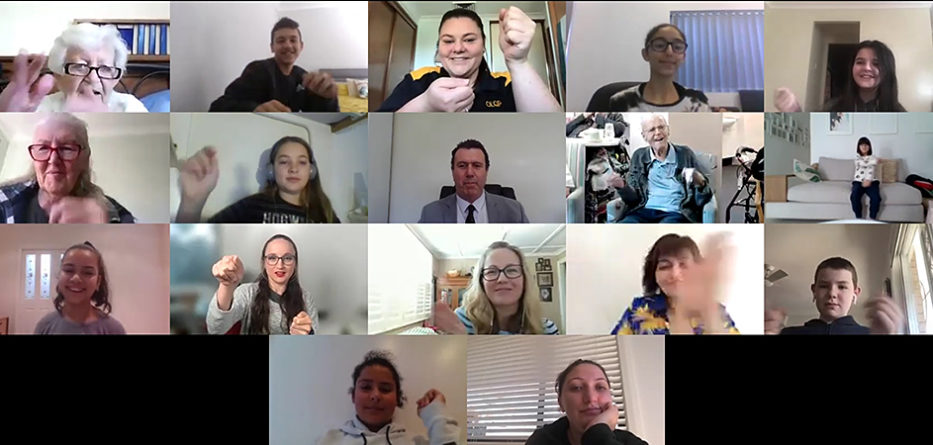For more than two years, the intergenerational learning using video conferencing program has been providing meaningful discussions involving students at Our Lady Queen of Peace Primary School Greystanes and elders at Southern Cross Care aged care facility, Greystanes.
Due to the reciprocal learning, health and behavioural outcomes for the students, teachers, elders and healthcare professionals involved in this program, it was one of five finalists nominated for a “Future of Ageing 2021” award.
The intergenerational learning using video conferencing program was designed for elders and school students to achieve reciprocal learning, health and behavioural benefits through weekly discussions based on school curriculum topics and other mutually interesting subjects. Our Lady Queen of Peace Primary School, Greystanes commenced these video calls in June 2019 with residents from Southern Cross Care Greystanes. The program has been facilitated by Greg Cronan from Intergenerational Learning Australia.
The foundations of this program come from evidence-based research by The Intergenerational Care Project at Griffith University along with other academic institutions in Australia, the USA, Europe and Asia.
This program is innovative on many levels, with one being the use of video conferencing for these weekly interactions involving the elders and school students. This is intended to complement co-located interactions in the same room. During these video calls, students learn about the topic and expand their vocabulary through the dialogue, knowledge and life experiences discussed by the elders.
Some benefits for students include improved literacy, communication, numeracy, behaviour, self-confidence and school attendance rates. The elders also learn about contemporary issues and subjects. This bi-directional and reciprocal communication is significant because it achieves personally meaningful outcomes for both age groups. Furthermore, research shows that well planned and purposeful interactions involving children and trusted elders has a positive effect on the physiology and neurology of the participants. One example is the improvements in mood, behaviour and attentiveness of the students that have resulted in an increase in learning outcomes and grades.
This program reduces the loneliness, social isolation and lack of purposeful mental stimulation of elders which have become more problematic due to COVID-19 ceasing and disrupting visits to elders. In addition, meaningful interactions with young children and school students fosters the use of memory and reminiscing for elders. Research indicates these factors can help delay the onset of dementia and diminish its severity.
When the Lifestyle Coordinator and colleagues at the residential aged care home were invited to participate, their response was overwhelmingly positive. Two weeks after the first video call, the Facility Manager stated, “This program has been a calming intervention for our residents. The involvement of one particular resident was significant. His mood became positive and his appetite returned.”
Furthermore, nighttime nurse call requests have decreased (indicating improved sleep) along with reductions in self-isolation within the first two weeks of the program. Family members also commented about less negativity in phone calls. The mood of staff was also happier.
This program has been an effective mental health and well-being invention for the elders plus the healthcare staff, teachers and students. It has resulted in improved mood for both age groups not just during the video calls, but for days after their interaction.
Ongoing positive relational interactions with trusted adults develops the socio-emotional, interpersonal and non-verbal communication skills of students, which prepares them for the workforce. Furthermore, longitudinal research by neuroscientists demonstrates the effects of adverse childhood experiences can be buffered and potentially healed through well-planned and purposeful intergenerational learning programs.
These outcomes are becoming increasingly important in today’s digital age, due to students spending up to 11 hours a day in front of a digital screen instead of meaningful face to face interactions with older people. The lack of these interactions negatively impacts the stress, physiology and neurology of students that can result in behavioural issues and learning difficulties.
This program commenced in 2019 and has continued on a weekly – and sometimes fortnightly basis –even through school holidays and COVID-19. It also addresses 43 recommendations by the Aged Care Royal Commission and 11 strategies from the Aged Care Workforce Strategy. It is now expanded to elders in their own home participating along with early childhood centres operated by Catholic Diocese of Parramatta Services Limited (CDPSL) at Greystanes and Blacktown.
Elders who have joined the Intergenerational Learning video call program from their own home during COVID-19 have been Frank Vella from OLQP Parish Greystanes and Val Fell, a member of the Older Persons Reference Group and Older Persons Advocacy Network (OPAN). Val was a recent guest on the ABC TV program, The Drum, where she discussed the impact of COVID-19 on older people, their loneliness, isolation and lack of socialisation. Val is 92 years of age and mid-way through her Degree in Dementia Care (UTAS). Diana Olsberg also joined this program during Term 3 from Randwick. Diana was one of the participants in the ABC TV program Old People’s Home For 4 Year Olds and is an Adjunct Professor at the University of NSW and Diana’s areas of expertise are the sociology of ageing, retirement and economics.
This program has resulted in significant interest from organisations within Australia and New Zealand. Guests from these organisations who have observed the intergenerational learning video calls range from diversional and occupational therapists, heads of psychology faculties, vocational education and pathways organisations (TAFE NSW, CathWest and Universities), other Catholic, independent and state schools, organisations within NSW Department of Education (RIEP and Technology 4 Learning), architectural organisations and other aged care organisations. As a result, an aged care organisation based in QLD and NSW has commenced the initial phase of this program.
Fundamental to this program for Catholic schools is pastoral care and mission for school students. It has been an excellent example of faith in action by caring for the vulnerable and poor. This aligns with Pope Francis’s comment about being ‘change-enablers’ and using technology to have meaningful connections with the vulnerable and poor in our community.
Catholic and state schools along with aged-care organisations within and beyond the diocese will be commencing this program. To get your school or an aged care organisation involved and for more information about the research and implementation of this program, contact Greg Cronan from Intergenerational Learning Australia on 0433 387 209 or visit the website at www.intergenerational-learning.com.au
With thanks to Greg Cronan and Intergenerational Learning Australia.








